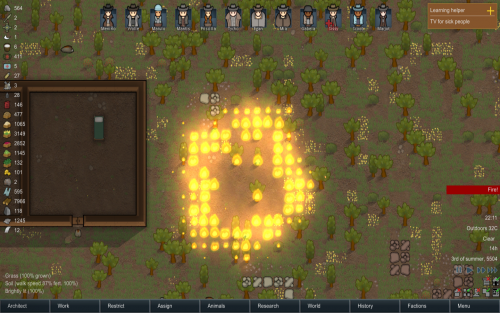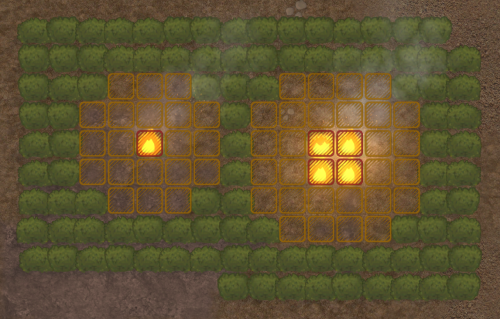Fire
| This article is a stub. You can help RimWorld Wiki by expanding it. Reason: Mechanics and numbers (heat production / fire spread / etc.). See also Flame Damage. |
Fire is a destructive force capable of destroying plants, buildings, and pawns alike. It spreads via embers that travel up to two tiles, and will start another fire if they land on something flammable. Fire may spread far and wide if left unchecked. Fire also causes a massive surge of heat when indoors. While inherently dangerous, fire can be used as a weapon or tool.
Colonists capable of firefighting will only fight fires in your Home area, although drafted pawns will douse adjacent fires, anywhere.
Sources of fire[edit]
| This section is a stub. You can help RimWorld Wiki by expanding it. Reason: List likely incomplete. |
- Temperatures above 235 °C (455 °F) will ignite flammable items and structures.
- Created from molotov cocktails, incendiary launchers, incendiary shells and IED traps, phoenix armor
 , and flamebows
, and flamebows .
. - Created from the explosions of a doomsday rocket launcher, orbital power beam targeter, and diabolus
 .
. - Humanoid raiders may light your colony's objects on fire, if there are no colonists available to fight.
- Human pawns will spontaneously start fires during a fire starting spree mental break
- Boomalopes and boomrats will cause fire on death.
- Lightning will cause fire. Rain will quickly put it out, but dry thunderstorms and Flashstorms won't have that.
- Conduit explosions (the Zzztt... event) will cause fire.
As a hazard[edit]
Fire is capable of destroying crops, resources, structures, and can injure or kill pawns. Fire can lead to explosions or roof collapse which can destroy even non-flammable items.
Fire Spread[edit]
Fire spreads by:
- Direct Ignition: A flame directly adjacent to the tile with flammable material
- Embers: They can jump over a tile, i.e. tiles that are 2 tiles away can be ignited by embers
- Indoors Room Temperature: Starting from 235 °C (455 °F) fire can spread everywhere in the room
Basic prevention[edit]
The most important step in preventing your entire colony from burning to the ground is to build using non-flammable materials like stone or plasteel, especially walls.
Firebreaks are also useful. Strips of non-flammable flooring, typically concrete or stone tile with a minimum width of two tiles, can be built around colony perimeter walls and other important structures in advance of wildfires.
Firefoam is a mid-game necessity for stopping fires, and at least one firefoam poppers should be installed in every room of value.
When any fire has been burning on the map for a long enough time (How long?), it will start raining on the map, even if the fire is indoors.
Pawns[edit]
Pawns will catch fire if on top of or adjacent to a burning item, hit by an attack from an incendiary weapon, or hit by a lightning strike. A pawn on fire will immediately enter a temporary "on fire" mental break, run around uncontrollably for several seconds, then slowly extinguish themselves or enter a body of water.
In their panic, pawns on fire will not attack and may uncontrollably run in to unsafe areas. The player can prioritize a different colonist to help put out the flames of their burning comrade. Also note that pawns on fire can spread fire.
While on fire, a pawn will receive 2 heat damage per second regardless of the flame size. They will typically receive burns on several random body parts. Heat damage has no armor penetration and is therefore easily affected by heat resisting apparel like devilstrand. If the fire is not extinguished, eventually a pawn will become incapacitated and burn until death.
Interiors[edit]
At higher temperatures (above ~235C/455F/508K), flammable items, flooring, and pawns can spontaneously ignite, and an orange haze effect will appear in the room. Room temperature depends on the number and duration of fires, insulation, unroofed tiles, and the ambient temperature, but it will generally return to normal within 1 day.
Pawns trying to put out indoors fires may collapse from heatstroke and will die if not rescued. Remove some roof tiles via Zones or hold one of the doors open before making a rescue attempt. Firefoam poppers or firefoam turrets may be hastily installed near an out-of-control inferno, too.
Objects[edit]
Objects and structures on fire will take damage to their hit points over time, may spread fire to other flammables up to 2 tiles away, and will disintegrate into ashes when HP reaches zero. The damage taken value is the same for everything. The size of the fire depends on the flammability of the material. Objects on fire may spontaneously extinguish themselves or be extinguished by a pawn, rain, or firefoam. Flammable floors will leave behind burned floor tiles. All turrets, mortars, mortar shells, and chemfuel have a chance to explode while on fire, which is preferable to burning up as explosions leave behind some scrap parts. Objects with 0% flammability can't catch fire, except flammable items stored inside a stone shelf will still burn.
As a tool or weapon[edit]
Fire can be utilized as a weapon or tool to counter things like infestations or to help capture enemy pawns.
Pawn Capture[edit]
In a killbox corridor, a small side area with doors connecting to the outside should be constructed. Additionally, add stone doors at the end of the corridor, but hold them open for now. Wooden barricades should then be constructed inside this area, this is your "fuel". Nearby, build a shelf with incendiary weapons for convenience. When enemies arrive, wait until all of them have entered the "killbox", then light the barricades on fire with incendiary weapons. Then, close the two doors at the end. The raiders will drop like flies after a while. Once their heatstroke reaches 0.7 severity (70% percent, extreme heatstroke), open the doors and put out the fires. Capture the pawns you want, and then either execute the remainder or let them flee once they regain consciousness.
Countermeasure against infestations[edit]
Infestations are difficult to clear, especially when spread through multiple (mined out) caves.
An effective method is to equip a colonist with an incendiary launcher or molotov cocktails and attack the hives one at a time.
Should one of your caves have power conduits running through all the area and completely sealed with roof, they could be used to spread the fire by closing the caves with walls and then simply shoot at a conduit to ignite. Insectoids will collapse and eventually die of burns or heatstroke, hives will ignite if the temperature gets high enough for spontaneous combustion.
Flora raze[edit]
A faster alternative to "Cut plants" to clear areas from vegetation that provides a tactical defense as it takes any possible cover object away from enemies. Equip an incendiary launcher or molotov cocktail and target to attack the desired area. The fire will spread rapidly in all directions, so the player must ensure there are no flammables near unintended sections. Rain will extinguish fire on unroofed areas.
Firefighting[edit]
Firefighting is most often accomplished by colonists "stomping" on the fire until it goes out completely. Another method of extinguishing fire is by deploying firefoam poppers that when triggered by flames will explode to blanket the area with fire-suppressing foam.
You can also blow fire out with an explosion like that produced by a grenade (draft a colonist who has grenades, target the fire).
Colonist firefighting behavior[edit]
By default, all colonists not currently working on another job will go to extinguish a fire, if capable, only if the fire is within a designated home area and the colonists' allowed area. Unlike other tasks that get reserved, colonists do not lock out each other from fighting the same fire and may work together to extinguish it quicker.
It is worth mentioning again that colonists only fight fires within a home area. Outside the home area, colonists will just ignore the fires and carry on with their duties. To fight fires outside of a home area or to fight fires in a coordinated manner, draft the colonists and place them NEXT to the fire. They will fight any adjacent fires and you can better move your colonists to strategically attack it.
Colonists can catch on fire while firefighting but will usually manage to put out the fire. If instead they become downed, the fire will consume them unless another colonist comes to put them out.
Pyromaniacs will never extinguish fires and in fact may sometimes start them.
Firefoam poppers[edit]
After their initial construction, firefoam poppers can be uninstalled and stored. Reinstalling them later—near a small-to-moderately sized field of fire—and manually detonating them allows a single pawn to quickly and safely complete a dangerous task that could otherwise occupy several pawns for many danger-filled hours.
Rain event[edit]
| This section is a stub. You can help RimWorld Wiki by expanding it. Reason: Specific triggers, chances, durations etc.. |
Extremely large and long lasting fires will force a rain event. Sufficient rain will gradually extinguish unroofed fires, and this event may even, eventually, control large wildfires.
Some fires after rain event are possible. Rain event may happen without extra delay between them.




